At the 10th annual edition of Latin America’s 50 Best Restaurants, Guatemalan restaurant Diacá received the Flor de Caña Sustainable Restaurant Award 2022. Chef-owner Debora Fadul tells 50 Best four stories that show how she pays homage to the earth through her esoteric cuisine
“I had no idea we were going to win. I was listening to the [presenter’s] speech thinking how similar that restaurant was to ours! It was a lovely moment,” reminisces Debora Fadul. The chef-owner was all smiles at the awards ceremony hosted in November 2022 in Mérida, Yucatán, where her restaurant Diacá received the Flor de Caña Sustainable Restaurant Award and she also celebrated its debut on the Latin America’s 50 Best Restaurants list.
With a name derived from the Spanish for ‘from here’, it’s unsurprising that sustainability is rooted at the heart of Diacá’s dining experience. Presented through eight creative courses, Fadul’s fare honours Guatemalan ancestral cuisine and endemic produce, while fostering a network of small producers across the country.
The chef’s connection to the land runs deep, extending beyond her plant-forward recipes. Each dish expresses a profound connection among humans, nature and food, elevating the dining experience from the sensory into the spiritual.
Through four stories about her guests, producers, and memories from her own life, Fadul explains how sustainability, national pride and local agriculture became the guiding principles behind the restaurant.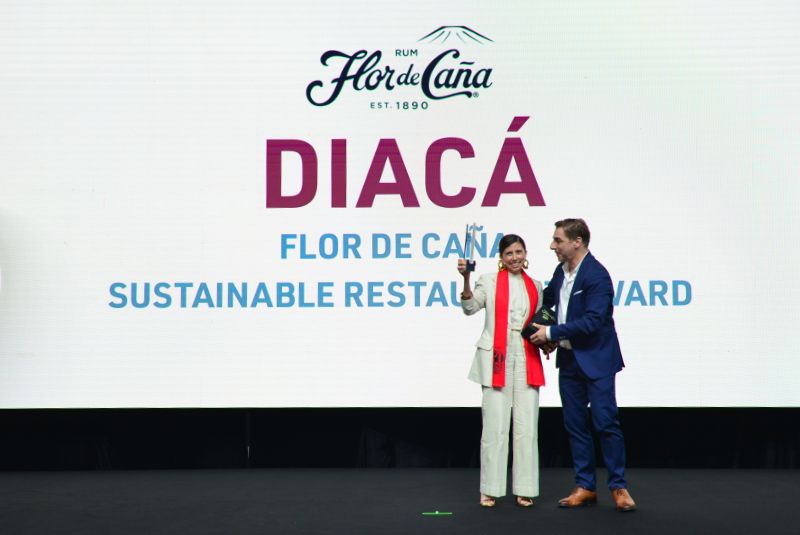
Debora Fadul received the Flor de Caña Sustainable Restaurant Award from El Celler de Can Roca's Jordi Roca
1. Ratatouille moments
“Many people find a meal at Diacá very emotional. Our team always says that our guests arrive at the restaurant blank, and come out with full hearts. We have a lot of Ratatouille moments,” she says with a smile, referring to the animated film in which a restaurant critic takes one bite of his favourite dish and, overwhelmed by emotion and nostalgia, is transported through his mind’s eye back to his mother’s kitchen table.
“One of my favourites was when we had a Russian guest on his first trip to Guatemala. He tasted our zapote dessert and suddenly started crying because it reminded him so strongly of the fruit in his grandmother’s garden.”
Countering expectations of stiff fine dining, Fadul weaves local and familiar ingredients into the menu to put her guests at ease. “When people first come to the restaurant, they treat the experience quite seriously, but as soon as they realise that we don’t have caviar and foie gras, but rather ingredients from the places where they have lived or were born, they become very comfortable. It’s beautiful to see,” she reflects.
“I think it’s because our guests are eating ingredients that have been grown with so much love, and cooked with so much respect, that they feel as though they’re eating a meal that a loved one used to cook in the same way.”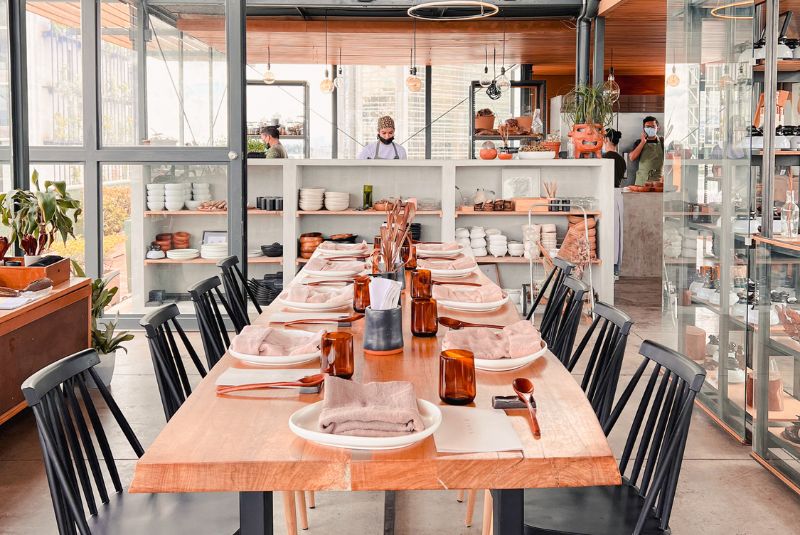
Diacá's dining room, located in the centre of Guatemala City
2. Teach a man to fish and he’ll eat for a lifetime
“Last week, one of the university classes that I teach took their final exams and every single one of the students used salmon in their recipes,” says Fadul. “I was completely shocked, because I never taught them to use salmon – it’s not even local to Guatemala. It really made me question how we let this happen. We have so much great fishing in this country, but we’re putting more value on something that is imported in a package from Europe or the US.”
Bordering the south of Mexico, Guatemala is in relative proximity to the US, a country with which it has strong trade links, but Fadul is keen to return to the nation’s roots. “We’re so influenced by imported food here, but I don’t think you can talk about cultural dishes if you’re cooking with poor or processed ingredients. In Guatemala, culinary traditions should be aligned with what we produce in our country,” she says.
Keen to showcase the local bounty, Fadul fills Diacá’s menu with endemic fish and vegetables. The Sierra mackerel has become a standout main dish: the whole fish is served with tangerine, plum, yellow corn and a light coconut sponge.
“Every Latin American nation holds something that you cannot find anywhere else in the world. We have something to be proud of here, but we’re losing it because we’re not paying attention to it,” Fadul explains. “Our main purpose at Diacá is to put value back into nature and show our guests how lucky we are to be in Guatemala.”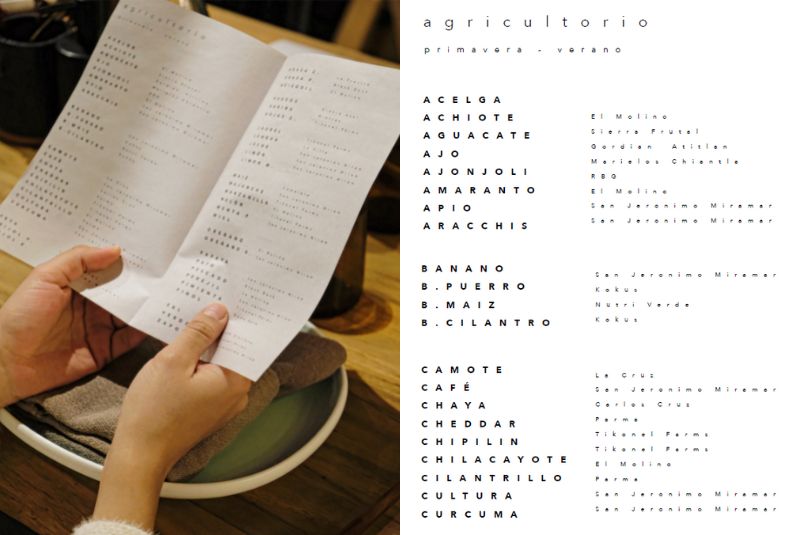
The tasting menu, 'Agriculturio', features the farmers and regions of every ingredient served
3. Green-fingered friends
“When you talk to Ecuadorians, Peruvians or Brazilians, they know so much about their country and what grows there. Agriculture takes up such a large part of Guatemalan life – it’s something that we should all know about,” emphasises Fadul.
Latin America boasts some of the world’s most biodiverse countries. “Most people think corn only comes in four types: red, white, yellow and black. But beyond the colours, there are 22 different varieties in Guatemala. And did you know that tomatoes originally come from Latin America, not Italy?”
Not only does Diacá source its ingredients exclusively from Guatemala, but Fadul goes the extra mile to celebrate the field-kitchen relationship. Through her magazine, UPMILH, Fadul educates her guests about the unseen work behind every dish. “Our diners can read about a specific producer, about their family and their farm,” she explains. The latest edition of UPMILH takes readers into the lives of the Ojer Gonzales family, whose business revolves around the cultivation of maíz criollo (white corn).
The restaurant’s tasting menu, aptly entitled ‘Agriculturio’, further demonstrates the lengths to which Diacá goes to hero Guatemalan farming. A map of the country proudly illustrates that produce comes from 15 of the country’s 23 regions, while the centre pages include an alphabetised index of every ingredient used and the farm in which it is grown.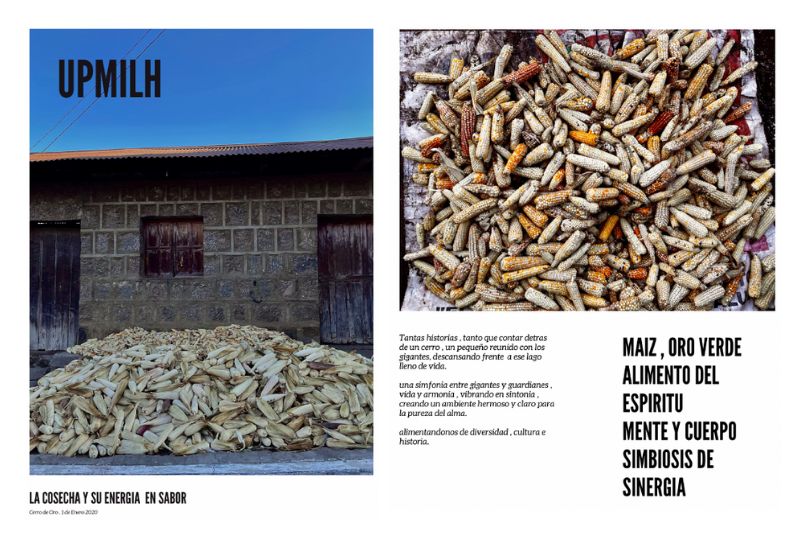
The recent edition of UPMILH describes the work behind the production of Guatemalan corn
4. Searching for deeper meaning
“When I eat, I feel like I’m a movie – images flash quickly across my mind. To me, a tomato doesn’t just taste like a tomato, but it has so many flavours. I’ve always had a connection with food and can use it to express what I really feel,” reflects Fadul.
The chef has always felt this innate understanding of food and flavours, which she has channelled throughout her culinary career into unusual – yet highly successful – combinations. “I remember when I started the company, I had the idea to put fish with white chocolate and rosemary. All the chefs thought it would be so strange, but I knew it was going to be fantastic,” remembers Fadul.
The ‘Agriculturio’ menu remains testament to her boundless creativity, featuring the likes of creamy rambutan with anacates (a Guatemalan variety of chanterelles), served with soft garlic whipped cream and chamomile; and a tortilla topped with peanut toffee, breaded fish and spirulina.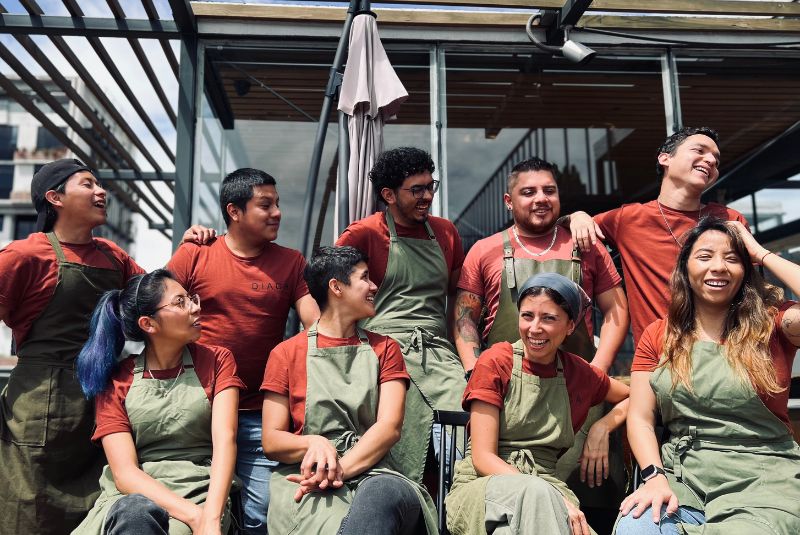
Fadul shares her passion for Guatemalan produce and the natural world with her team
For Diacá’s chef, these experiments are not just about the eccentric flavours, but are mimetic of a deeper symbiotic relationship between food and the natural world. Fadul encourages her team to take a similar, holistic approach to food while cooking at the restaurant.
“It’s not like I have a superpower!” she laughs. “Anyone can do it, but you do have to train your brain. I try to get everyone – from my team to my guests – to feel food and nature the way I do. It’s a connection. And a conversation that we all need to keep having.”
The Flor de Caña Sustainable Restaurant Award was open to all venues on the Latin America’s 50 Best Restaurants 2022 list by self-nomination and is independently assessed by the Sustainable Restaurant Association, the world’s leading F&B sustainability programme and 50 Best’s Sustainability Audit Partner.
The list of Latin America’s 50 Best Restaurants 2022, sponsored by S.Pellegrino & Acqua Panna, was announced on Tuesday 15th November. Follow us on Instagram, like us on Facebook, find us on Twitter, tag #LatAm50Best and subscribe to our YouTube channel for the latest news.

